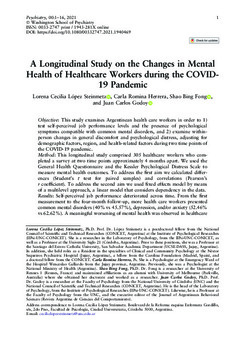| dc.contributor.author | López Steinmetz, Lorena Cecilia | |
| dc.contributor.author | Herrera, Carla Romina | |
| dc.contributor.author | Fong, Shao Bing | |
| dc.contributor.author | Godoy, Juan Carlos | |
| dc.date.accessioned | 2021-09-03T03:10:22Z | |
| dc.date.available | 2021-09-03T03:10:22Z | |
| dc.date.issued | 2021-07-30 | |
| dc.identifier.issn | 1943-281X | |
| dc.identifier.other | https://doi.org/10.1080/00332747.2021.1940469 | |
| dc.identifier.uri | http://hdl.handle.net/11086/20083 | |
| dc.identifier.uri | https://www.tandfonline.com/doi/full/10.1080/00332747.2021.1940469 | |
| dc.description.abstract | Objective: This study examines Argentinean health care workers in order to 1) test self-perceived job performance levels and the presence of psychological symptoms compatible with common mental disorders, and 2) examine within-person changes in general discomfort and psychological distress, adjusting for demographic factors, region, and health-related factors during two time points of the COVID-19 pandemic.
Method: This longitudinal study comprised 305 healthcare workers who completed a survey at two time points approximately 4 months apart. We used the General Health Questionnaire and the Kessler Psychological Distress Scale to measure mental health outcomes. To address the first aim we calculated differences (Student’s t test for paired samples) and correlations (Pearson’s r coefficient). To address the second aim we used fixed effects model by means of a multilevel approach, a linear model that considers dependency in the data.
Results: Self-perceived job performance deteriorated across time. From the first measurement to the four-month follow-up, more health care workers presented common mental disorders (40% vs 45.57%), depression, and/or anxiety (52.46% vs 62.62%). A meaningful worsening of mental health was observed in healthcare workers who expressed concern about being infected with COVID-19, whether asymptomatic (greater general discomfort and psychological distress) or symptomatic (greater general discomfort). Likewise, there were significant interactions between a history of mental disorder and concern about COVID-19 infection.
Conclusions: Among healthcare workers, the uncertainty about the COVID-19 infection may have larger negative mental health impacts than actually being infected. | es |
| dc.language.iso | eng | es |
| dc.rights | Attribution-NonCommercial-NoDerivatives 4.0 Internacional | * |
| dc.rights.uri | http://creativecommons.org/licenses/by-nc-nd/4.0/ | * |
| dc.subject | Covid 19 | es |
| dc.subject | Health care | es |
| dc.subject | Workers | es |
| dc.subject | Psychological symptoms | es |
| dc.subject | Mental disorders | es |
| dc.subject | Psychological distress | es |
| dc.subject | Pandemic | es |
| dc.title | A Longitudinal Study on the Changes in Mental Health of Healthcare Workers during the COVID-19 Pandemic | es |
| dc.type | article | es |
| dc.description.version | publishedVersion | es |
| dc.description.fil | Fil: López Steinmetz, Lorena Cecilia. Universidad Nacional de Córdoba, Facultad de Psicología; Argentina. | es |
| dc.description.fil | Fil: López Steinmetz, Lorena Cecilia. Consejo Nacional de Investigaciones Científicas y Técnicas. Instituto de Investigaciones Psicológicas; Argentina. | es |
| dc.description.fil | Fil: Herrera, Carla Romina. Hospital Wenceslao Gallardo, Jujuy; Argentina. | es |
| dc.description.fil | Fil: Fong, Shao Bing. University of Melbourne; Australia. | es |
| dc.description.fil | Fil: Godoy, Juan Carlos. Universidad Nacional de Córdoba, Facultad de Psicología; Argentina. | es |
| dc.description.fil | Fil: Godoy, Juan Carlos. Consejo Nacional de Investigaciones Científicas y Técnicas. Instituto de Investigaciones Psicológicas; Argentina. | es |
| dc.journal.city | Washington | es |
| dc.journal.country | Estados Unidos | es |
| dc.journal.editorial | Taylor & Francis Group | es |
| dc.journal.pagination | 1–16 | es |
| dc.journal.title | Psychiatry | es |





